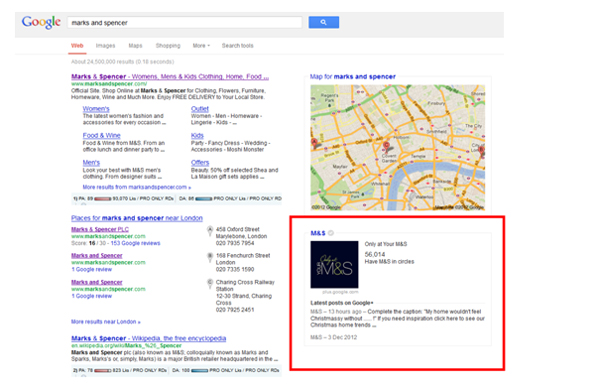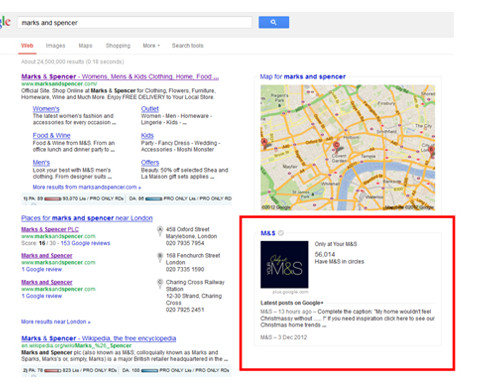Google shared their plans for 2013 to their affiliated agencies. In this article, we share what 2013 holds for Google and what it means for your online business.
On the 23rd November, Metakinetic’s Search Marketing team was invited to the exclusive invite only Google Engage Event; Box of Tricks for Agencies at the impressive One Marylebone in London. Walking in to the Soane Hall you could see the eager Search Marketing Specialists, Executives and Heads ready to soak in everything Google had to say. The event focused on both organic (SEO) and paid (PPC) search marketing within the Search Engine Giant, whilst also dipping its toe into the Social Media realm of Digital Marketing. For those unable to attend, take a look at what to look forward to in 2013 with Google.
Mobile is Pivotal
With many mobile statistics, Google proved their point of mobile, in particular mobile commerce, being the future with 51% of mobile phone owners having a love for their smartphone already, this is only going to increase. It is predicted that in 2013 more people will access the internet via their mobile device, whether it is their smartphone or tablet, than any other device. If that is not enough to grab your attention, in 2015 it is estimated that there will be a mobile device for each and every person on the earth. Just think to yourself, how many mobile devices do you have yourself? Maybe a personal smartphone, a work smartphone and a tablet too? That is three to yourself, soon you’ll have a personal tablet and a work tablet and many even a hybrid of the two like the Samsung Galaxy Note; a merge of the tablet and the phone.
So what does this mean for online businesses, in particular ecommerce? Google recommend going mobile, and despite user demand, only 10% of advertisers have a mobile site. We were shocked too; mobile technology is changing our customer journey. 64% of us admit to using mobile devices whilst in store in the UK to compare prices and to see what else is out there. Therefore, can you afford to not only not have an online presence, but not have a mobile presence either?
Google+ to Benefit Positioning
Google+ is described as a ‘social spine that underpins and strengthens all of Google’. So as Google expands into the Social Media sector, it is important to look at what Google+ can do for your ecommerce business and increase your reach.
The Search Giant holds the majority of the cards when it comes to search marketing due to the sheer dominance in the market share, so the theory is what they say goes if you wish to succeed online. However, it isn’t as simple as surrendering to Google, instead Google’s mission is to organise the world’s information and make it universally accessible to you, improving the user’s experience. When you think about it, don’t we all want to improve the customer experience? It is definitely a hot topic in retail, both in store and online; so instead, think of Google as an advisor with their algorithms.
Although many were distraught at the effects of the infamous Panda and Penguin updates, what the user is left with is high quality, relevant results to their search queries, removing those awful spam sites. Let’s just say agencies that were using black hat practices are now seeing white as the new black after many hours, days, weeks and possibly months of hard work. Luckily, we at Metakinetic can say we only believe in ethical and natural SEO strategies to give our clients high ranking and genuine positions.
With Google+ being a little over a year old, the service has achieved over 40 million members and 1 million brands as users. These impressive stats transfer to daily active users spending an average of 60 minute on Google+ per day. Within Google+ users can search queries and keywords as they would in Google. However, brands with a Google+ account which are relevant to the search query will be favoured with the displaying of their company profile on the right hand side (where PPC adverts would usually be seen on Google). Let’s take Marks & Spencer as an example to demonstrate how this works. In the image below you can see the Google search results appearing in the usual format, however on the right posts from Marks & Spencer’s Google+ appear on the right in a larger predominant position, making it more eye catching and resulting in more clicks.

When discussing the benefits of Google+, Google also stated the user is more likely to click on your company’s result if they can see their connections have endorsed your brand through the social extension g+1. They have found it has given brands whose G+ profile appears as part of search results a Click through Rate (CTR) increase of 5 to 10%. Therefore integrating search marketing with social media to improve the performance of your ecommerce business give a higher chance of conversions.
Google Shopping to Change
Google Shopping UK has been announced to change to the US model. With it comes the paid advert option for Google shopping, where paid adverts will display a sponsored tag. Google Shopping’s paid adverts work in the same way as PPC (Pay per click) works; simply contact your search marketing agency to see if they can incorporate a Google Shopping campaign to your search marketing. This expands brands being able to advertise their products when certain keywords are searched in shopping, increasing reach.
Like PPC, the paid section of Google shopping will be displayed above the organic results, however still being sectioned off using a sponsored tag. This way the users can still determine which type of results they want to choose from. The combination of both paid and organic results can optimise any Google shopping campaigns to ensure you reach your customers. Alongside an effective ecommerce solution, Google Shopping can give you access to a different audience, in the same way that Amazon or eBay have an audience that have certain buying habits, so does Google Shopping. Using Google shopping and your ecommerce solution together can increase the audience reach and enhance your conversions.
The Importance of Remarketing
Remarketing is the use of cookies to track the journey of your users, presenting them with your adverts in Google’s Domain Network. This enables you to target users that have accessed your website and left it without carrying out the desired action, such as a purchase, giving you a second chance to re-engage with a large proportion of your traffic; 96% of visits have undesired results.
Within your traffic you will have a variety of audiences; you need to create different remarketing campaigns for each specific audience to increase your chances of conversion. For instance, around Christmas time, new traffic may be those looking for a Christmas gift for a loved one. Your remarketing campaign can be tailored to reach someone a certain number of times in a selected period to make your remarketing as effective as possible.
Analytics to Go Universal
For those who use Google Analytics to measure the performance of your website, we have good news for you. At the Google Analytics Summit in California October 2012, Universal Analytics was announced, a new way to measure the performance of not only your website and online presence but also your business.
Using a different type of cookie, it tracks your customer journey from online to in the store, by integrating all aspects of your data, whatever your device. For example, this new data platform is able to integrate the data from laptops, tablets and mobile devices to create a better understanding of how your customer’s decision journey is carried out. As a result you can streamline your online campaign to increase conversions. This cross-channel measurement allows online businesses to discover the correlation between the channels to optimise conversions, developing a customer-centric campaign.
So what does this mean for ecommerce? With the use of loyalty cards the customer’s journey is measured, for instance signing in to your online site to research a product they are looking at buying. Often, if the customer does not buy on your site it is measured as an opportunity missed. However, if the customer then goes into store to buy the product they were looking at, with Google’s Universal Analytics it is reported as a conversion with the true customer’s journey measured, making your metrics more accurate. With accurate information you are able to transfer it to heighten your customer’s experience, for instance, if your customer does their buying research on your ecommerce system, why not email them a discount code to use online; increasing online sales and showing the customer the ease of buying online.
Final Note:
After an afternoon of insightful information our search marketing sponges returned back twice the size that they arrived at Google Engaged in; it is still questionable whether it was the sheer amount of information, the cocktails afterwards, or the food!






